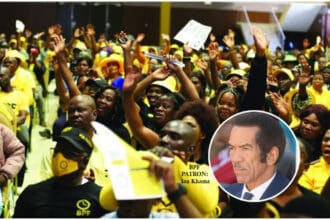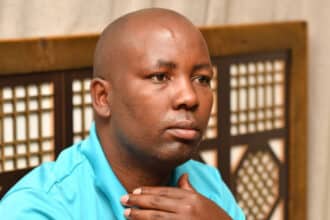PRINCE HARRY CONDEMNS DRILLING FOR OIL IN THE OKAVANGO DELTA, MOBILISES THE WORLD TO STOP IT
One of the most powerful men in the world, Prince Harry, has lent his weight to climate change activists and human rights groups by strongly condemning Canadian company, ReconAfrica’s fracking and drilling for oil and gas activities within Cubango-Okavango River Basin area.
The Duke of Sussex was adding his voice to that of many environmental and climate change activists and conservationists who have questioned, criticised and protested against the Canadian oil and gas company for exploratory drilling in the pristine area of Namibia and Botswana
In an opinion piece published in several newspapers in Europe this week, including Sunday world, Harry has come out guns blazing against what he calls, ” An imminent threat to Okavango Delta.”
“The Okavango River Basin is under siege by ReconAfrica, a Canadian oil and gas company that has been granted licenses for exploratory drilling in an area of Namibia and Botswana larger than some European countries. We believe this would pillage the ecosystem for potential profit. Some things in life are best left undisturbed to carry out their purpose as a natural benefit. This is one of them,” wrote Harry.
The Duke of Sussex who reportedly got engaged to his wife, Megan Markle in Botswana stated that he found, ” Sanctuary and inspiration in Okavango, and the environmental effects of drilling are a critical concern.”

Giving an example with a recent pipeline leak off the coast of Southern California, which reportedly pumped huge amounts of oil into the Pacific ocean and an incident in which an oil company lit the ocean on fire in the Gulf of Mexico, Harry expressed fear for the future of Okavango which he said can potentially be destroyed by the planned oil and gas mining.
“There is no way to repair the damage from these kinds of mistakes. Drilling is an out-dated gamble that reaps disastrous consequences for many, and incredible riches for a powerful few. It represents a continued investment in fossil fuels instead of renewable energies,” he added.
Harry is a co-founder of the non-profit Archewell Foundation and is president of African Parks, a nongovernmental organisation. He is said to have written the opinion together with a Namibian environmentalist and conservationist, Reinhold Mangundu.
The duo were in fact making a call and mobilising the world to stop the mining oil in the water basin.
He further added, “ReconAfrica’s materials indicate it may drill for 25 years, and because the region’s waters eventually drain into the Kalahari Desert, pollutants could accumulate.”
His further contention was that the risk of drilling will always outweigh the perceived reward and that in a region already facing the abuse of exploitation, poaching and fires, the risk is even higher.
“To protect the Okavango River Basin, we call on the world to stand in solidarity with us, our allies and local communities in advocating a full moratorium on oil and gas development in the region. We also encourage investors to note who profits,notably, ReconAfrica and its partners and who is at risk from likely environmental destruction.”
Meanwhile the University of Botswana’s Okavango Research Institute in Maun holds a similar view although they have insisted that there is currently no record that Botswana has given consent or agreed to the drilling exploration while Namibia has consented to it.
“The Okavango Delta is a vulnerable part of the Cubango-Okavango River Basin (CORB) because of its location downstream and significant dependency on flood water from Angola and Namibia. Any drilling done within the CORB or along the fossil rivers whose drainage leans towards the Kavango River will have a huge impact on the underground water, vegetation and wildlife,” noted the university in its position paper.

The Institution further noted that the Reconnaissance Energy Namibian was issued with the PEL 73 to carry out the exploration work in six blocks and two of these blocks (1721 and 1821) are traversed by the Okavango River, “Any pollution to the ground and surface waters of the Kavango River in Namibia will contaminate the Okavango Delta, which is at the lower end of the river basin. Pollution to surface and ground water could come from e.g. extracted hydrocarbons leaking into ground water, illegal disposal or accidental spills of wastewater containing toxic and radioactive elements.”
They further explained that in Namibia, a drill hole of 30cm x 30 cm will be made, and an area of 250m x 250m area is expected to be graded and prepared for placement and movement of machinery for operation around the drill hole.
“Although the impact will be heavy around the 250 x 250m block, the impact of the drilling activities will nonetheless be felt beyond this area in the form of hydrocarbon emissions, noise pollution from the machinery used at the site, clearing of vegetation for construction of access roads, bright lighting that disturb animals in the nearby habitats, and high extraction of ground water and possible spillage of inadequately treated waste water.”
Okavango Delta was listed as a world heritage site by UNESCO in 2014 and one of the binding requirements of the listing is non-pemissiblee commercial mining of any mineral, gas or oil within it and the said Canadian company is said to be exploring for potential mining with profits.
The Okavango Delta is also a RAMSAR site in which mining is not allowed and should the exploration for minerals, oil and gas be allowed, ORI maintains, there is a high chance that a mineral, oil or gas may be found given that the Delta is sitting on Karoo sediments and shale rocks which in other parts of the world have been found to be sources of oil and gas deposits.
“Should oil or gas be discovered, there will be a strong socio-economic pressure to mine oil or gas and create jobs for the masses. If fracking operations proceed, the extraction process poses a significant risk of GHGs escaping into the atmosphere. A major fraction of the gasses released contains methane which is a more potent GHG than carbon dioxide.”
The fear is the ultimate death of the delta will then kill tourism, farming and other activities that comminities in this part of this country depend on for survival while the oil company would have made its profits.





